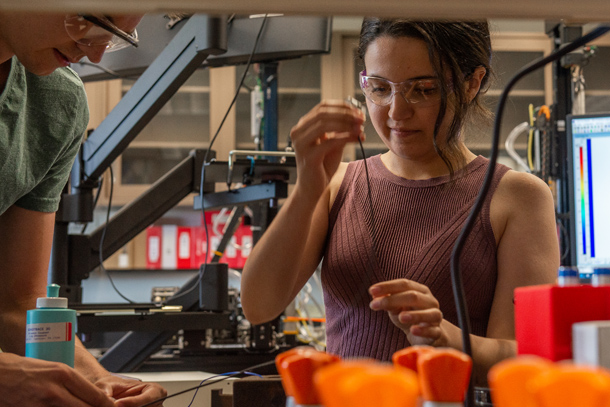
Andrea Argüelles, assistant professor of engineering science and mechanics in the Penn State College of Engineering. Credit: Kate Myers/Penn State
Andrea Argüelles receives 2024 NSF CAREER Award
March 20, 2024
UNIVERSITY PARK, Pa. — Andrea Argüelles, assistant professor of engineering science and mechanics in the Penn State College of Engineering, earned a five-year, $696,010 U.S. National Science Foundation (NSF) Early Career Development (CAREER) Award for a project titled, “Advancing ceramic processing science through acoustic characterization.”
Q: What do you want to understand or solve through this project?
Argüelles: This project aims to develop a fundamental understanding of how processing conditions impact the resulting structure and properties of ceramics manufactured through the novel cold sintering process. By developing advanced multi-modal characterization approaches centered around acoustic methods and integrating them with in situ monitoring, I seek to uncover the key mechanisms governing densification at various stages. This will enable optimization and broader adoption of cold sintering technology for manufacturing bulk ceramic parts with comparable properties to conventionally sintered counterparts.
Q: How will advances in this area impact society?
Argüelles: Cold sintering provides an eco-friendly, energy-efficient alternative to conventional ceramic manufacturing that is becoming increasingly important across industries as new technologies are developed. By reducing sintering temperatures by an order of magnitude, this process significantly reduces energy usage. Optimizing the process to ensure uniform, high-performing components will enable broader application of cold sintering to a wide range of material systems, including previously incompatible materials and multifunctional components. This can have substantial environmental benefits and facilitate the development of novel material combinations and functionalities.
Q: Will undergraduate or graduate students contribute to this research? How?
Argüelles: Each year, an undergraduate student will be recruited to conduct research through programs like the Equity Research Experience for Undergraduates Program, the Penn State Engineering Science honors program, or SURIEA, a summer research program through the Acoustical Society of America. Undergraduate students will gain hands-on experience in manufacturing cold sintered components, acoustic data collection and independent analysis of multi-modal data.
Graduate students will play a key role in all aspects of the research, from developing the in situ monitoring system to establishing process-structure-property linkages. They also will contribute to mentoring undergraduates and leading outreach activities like the Girls Learn About Sound in Solids (GLASS) program for middle and high school girls, which I will facilitate in partnership with Girls Code the World.
Q: The NSF CAREER award not only funds a research project, but it also recognizes the potential of the recipient as a researcher, educator and leader in their field. How do you hope to fulfill that potential?
Argüelles: Through this CAREER project, I aim to establish myself as a leader at the intersection of mechanics, materials science and advanced manufacturing. By developing transformative characterization techniques and uncovering fundamental mechanisms governing cold sintering, I hope to make significant contributions to the field of ceramic processing science.
At the same time, I am deeply committed to enhancing science, technology, engineering and mathematics (STEM) education. I plan to develop course modules that bring research on wave propagation in complex media into the classroom, providing students with interdisciplinary knowledge. By creating the GLASS outreach program, I aim to show young girls exciting opportunities in STEM fields.
A key priority for me is fostering an inclusive, supportive environment in my research group. I will prioritize recruiting students from underrepresented groups and implementing best practices for their retention and success. By engaging my students in interdisciplinary research, outreach and mentorship activities, I aim to help them develop technical skills while cultivating leadership, communication and teamwork abilities.
Furthermore, I will leverage my involvement in professional societies to disseminate research findings, build collaborations and advocate for increased diversity in STEM. I believe this holistic approach of integrating research, education, mentorship and leadership will allow me to fulfill the potential recognized by the NSF CAREER Award and make a lasting impact in my field and the broader scientific community.



